Article's Content
Artificial Intelligence (AI) is carving out new frontiers across pretty much every segment of the Software as a Service (SaaS) landscape. It’s reshaping how people interact with software and creating new avenues for companies to make money. All in all, it’s expected that generative AI will add $15.7 trillion to the global economy.
Customer Relationship Management (CRM) is one SaaS niche where the AI transformation is well underway. According to Google Trends, the search term “ai crm” has increased fourfold over the past two years.

This uptick in interest isn’t surprising, considering that the use of AI was highest among marketing and sales departments in 2023.
The ability to rapidly consume, summarize, and create text that generative AI provides pairs perfectly with the common tasks that these departments use CRMs for:
- Predictive analytics
- Enhanced customer engagement
- Streamlined sales processes
Let’s dive into the increasing role of AI in CRM and look at how four vendors in this space — two industry leaders and two mid-market options — are preparing for the change with new products, strategic approaches, and marketing tactics.
AI is Making a Big Splash in the CRM Space
The CRM landscape is a highly competitive SaaS vertical — and for good reason. Every business sells to someone else, whether it’s another business or individual consumers, and CRMs help them do this in a more effective way. The universal business need for centralized tools that store customer information and facilitate interactions has led to massive growth in the industry.
According to G2, there are just under 700 CRM vendors in the niche, and Statista predicts that they will generate a total revenue of $88 billion in 2024.
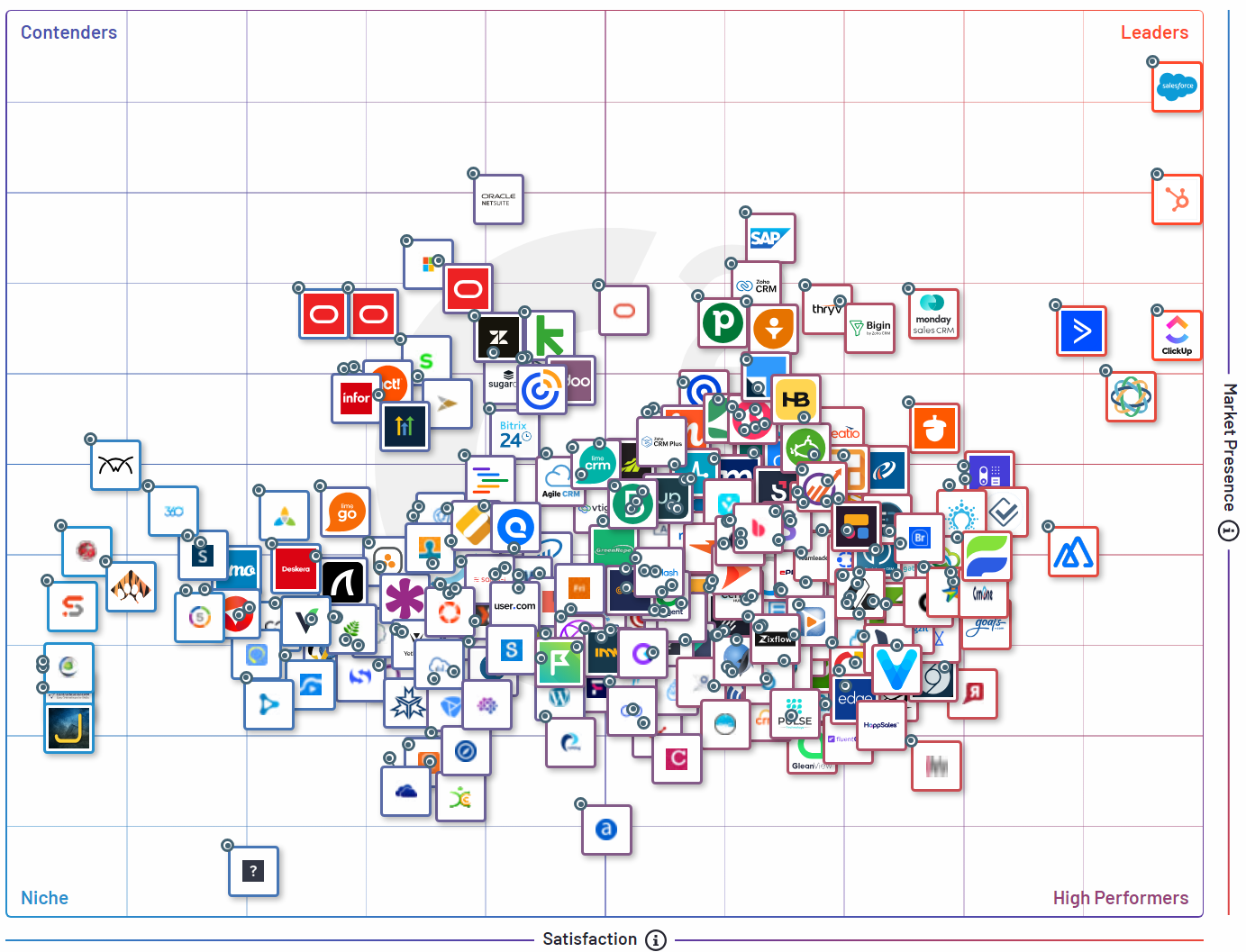
Generative AI has the potential to transform the CRM landscape, whether it’s by pushing leading companies like Salesforce and HubSpot further ahead or helping others like Pipedrive catch up.
Artificial intelligence understandably leads CIO’s list of 9 CRM Changes for 2024, with leaders particularly interested in how the technology can be used to:
- Automate manual, time-consuming tasks in the CRM workflow, like transcribing and summarizing calls or creating marketing materials.
- Power a new generation of chatbots that respond to queries from customers and leads in real-time with intuitive answers.
- Enable more collaborative interactions between human users and digital copilots, where the former focus on strategic priorities.
- Digest vast amounts of customer data and use generative and predictive AI to forecast business outcomes.
As CRM vendors continue to embrace AI, the industry is set to witness a new era of customer relationship management characterized by increased efficiency, deeper analytics, and more personalized customer interactions.
But before CRM companies can reap the financial benefits of this new technology, they need to educate their current and potential customers. While many in the tech industry are aware of the benefits generative AI brings, CRM users from other industries may not be. This is where content marketing comes into the picture.
How CRM Leaders are Responding to the Rise of AI
The emergence of any truly disruptive technology pushes companies to make strategic and operational changes. Companies have had to adapt to the rise of mobile apps, cloud infrastructure, and big data. The infusion of AI into CRM is another of these significant changes redefining how businesses interact with and manage their customer relationships.
The best way to learn from these seismic shifts is to observe how the greats navigate them. Let’s take a look at how enterprise CRMs Salesforce and HubSpot are handling the AI boom.
Salesforce
Salesforce has been ahead of the curve when it comes to AI in the CRM space. The company launched their predictive AI tool, Salesforce Einstein, back in 2016, so they were already experimenting with the technology when OpenAI launched ChatGPT in late 2022.
Salesforce has also acquired a number of machine learning and AI companies in the last decade to help expand their capabilities.
Here’s how Salesforce is powering a CRM Suite with the predictive and generative AI capabilities of Einstein:
- Lead and Opportunity Management: Helps prioritize high-potential leads, identify at-risk deals, and improve forecast accuracy for better sales decisions.
- Sales Automation and Guidance: Reduces administrative tasks, recommends best actions at each sales stage, and makes finding information easier for greater sales efficiency.
- Customer Service: Streamlines case assignments, suggests solutions to agents, and provides self-service options for faster, more personalized service.
- Marketing and Analytics: Identifies the most engaged prospects, enables targeted segmentation, optimizes email timing, and delivers deeper insights for improved marketing ROI.
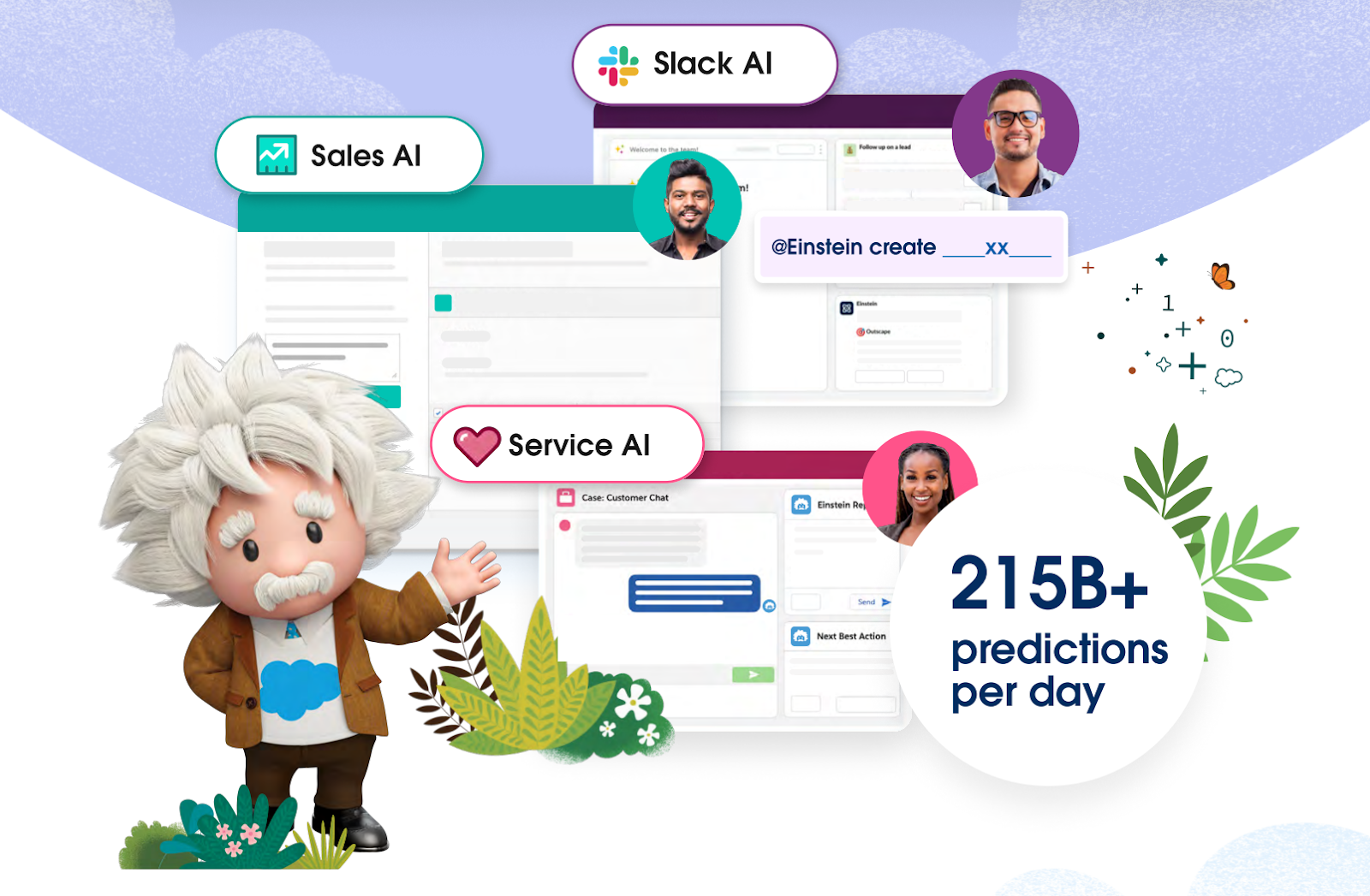
Einstein works with both private and public data and models from OpenAI and their competitors like Anthropic and Cohere. They also have a $500-million investment fund, Salesforce Ventures, to “bolster the AI startup ecosystem.”
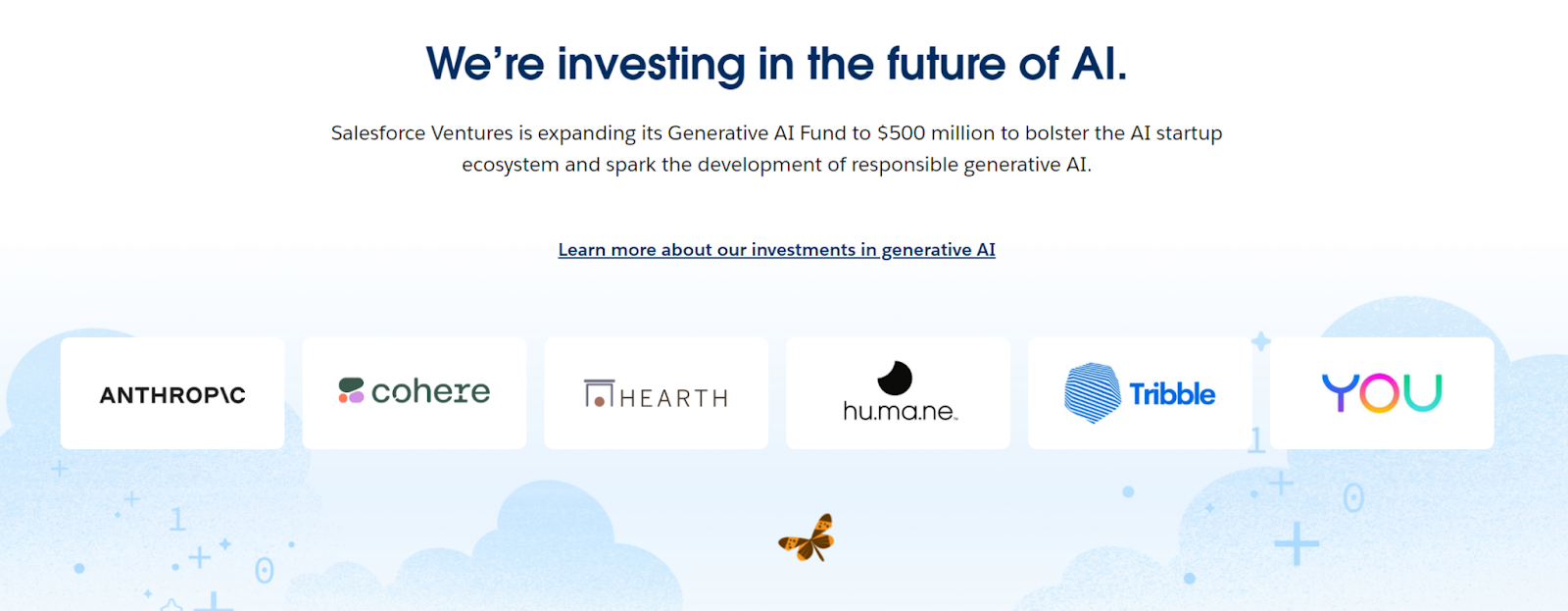
So, Salesforce is obviously all-in on the transition to AI from the business and product perspective, but how are they communicating these changes to current and potential customers?
Well, they currently have nearly 2,000 pages that rank for keywords that include “AI” or “artificial intelligence.” That’s a lot of content dedicated to this new technology, and it currently drives over 18,000 monthly organic visits.
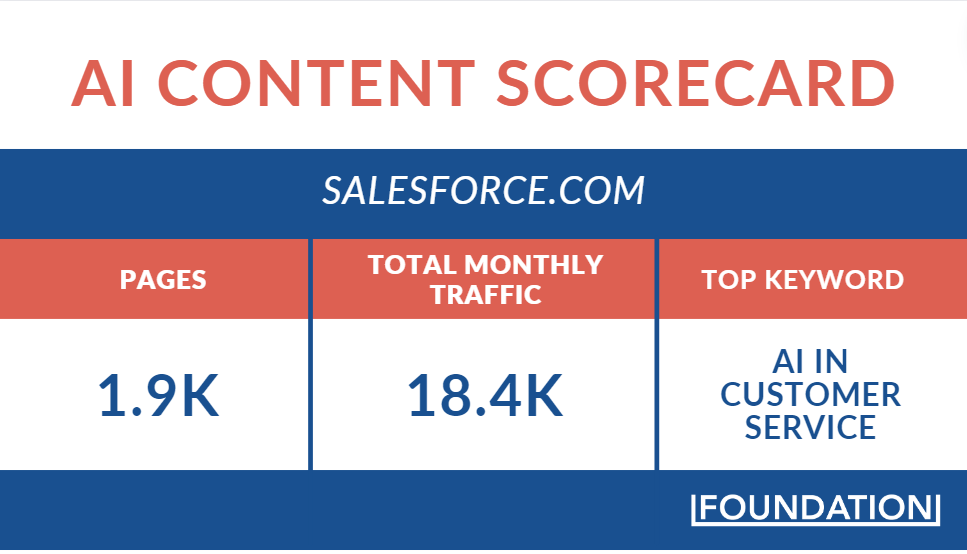
The top-performing pages include resource guides, blog posts, and product landing pages. With this spread, Salesforce can target potential and existing customers with varying levels of awareness about the benefits of AI in CRM.
One of the top traffic magnets in this AI arsenal is a long-form guide titled “Everything You Need to Know About AI in Customer Service.” It currently brings in about 1,500 monthly visits at an estimated value of $9.6k.
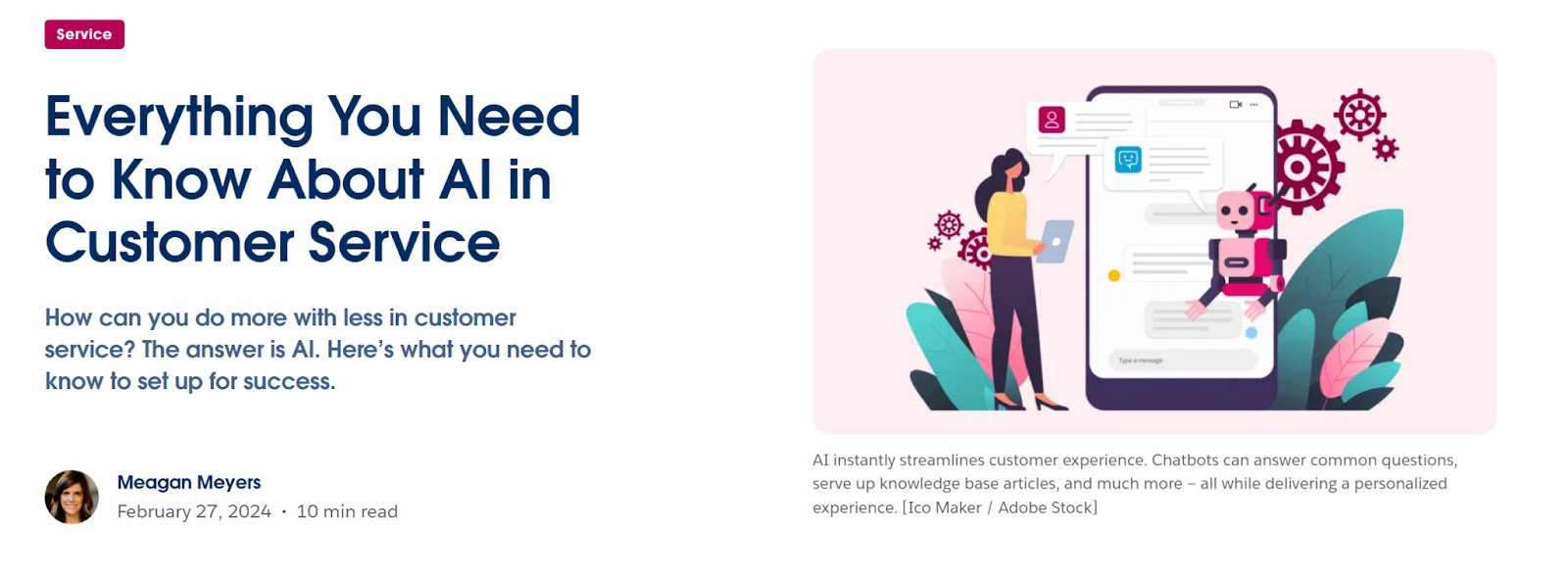
It’s a top-of-funnel (ToFu) piece covering the impact this new technology is having on the industry.
The article explores a number of topics that look like they’re straight out of the People Also Ask section, so Salesforce could take over a featured snippet spot or other prime SERP real estate with this piece:
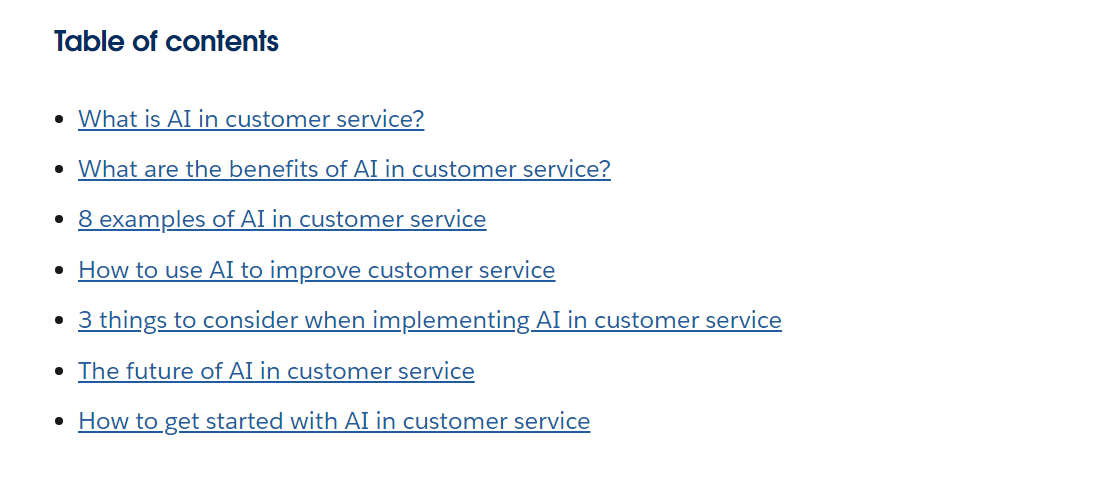
This type of long-form, text-heavy post also provides plenty of opportunity for internal linking to other Salesforce content, particularly product pages.
Salesforce clearly has the AI functionality, industry connections, and marketing capabilities to be a lead enterprise CRM as we transition into the age of artificial intelligence. To continue to build out their strategic position, they need to keep creating assets that educate users on the power of AI in CRM.
If you have the budget, video content is a very effective way to spread educational and promotional content to your customers. Salesforce has earned a staggering 190 million views on YouTube across 1,200+ videos, and they’ve recently started turning their attention to AI with a dedicated playlist on the topic.
For a prime example of how to promote AI with video content, check out the latest Salesforce YouTube post on Einstein Copilot:
With such a big headstart in terms of AI investment on the product side, it’s an uphill battle for CRMs looking to catch Salesforce. But, as we’ll see in the next section, that doesn’t mean you can’t beat them in another avenue.
HubSpot
HubSpot is a massively successful company in their own right. They started as a CRM and have expanded to a complete suite of tools for everything from sales and marketing to customer service.
That said, they have a long way to go to catch Salesforce, a pioneer of CRM who started investing in AI much earlier. According to their 2023 product roadmap, HubSpot currently has four different avenues for integrating AI into their CRM:
- AI Assistants: A public beta of generative AI tools to help sales and marketing teams create content more quickly.
- AI Agents: A Service Hub chatbot that can create and execute its own plan based on high-level company goals
- AI Insights: A suite of predictive AI features that assist with the analysis of customer interactions
- ChatSpot: a ChatGPT-powered AI assistant that connects with HubSpot CRM to help with prospecting, content creation, and reporting.
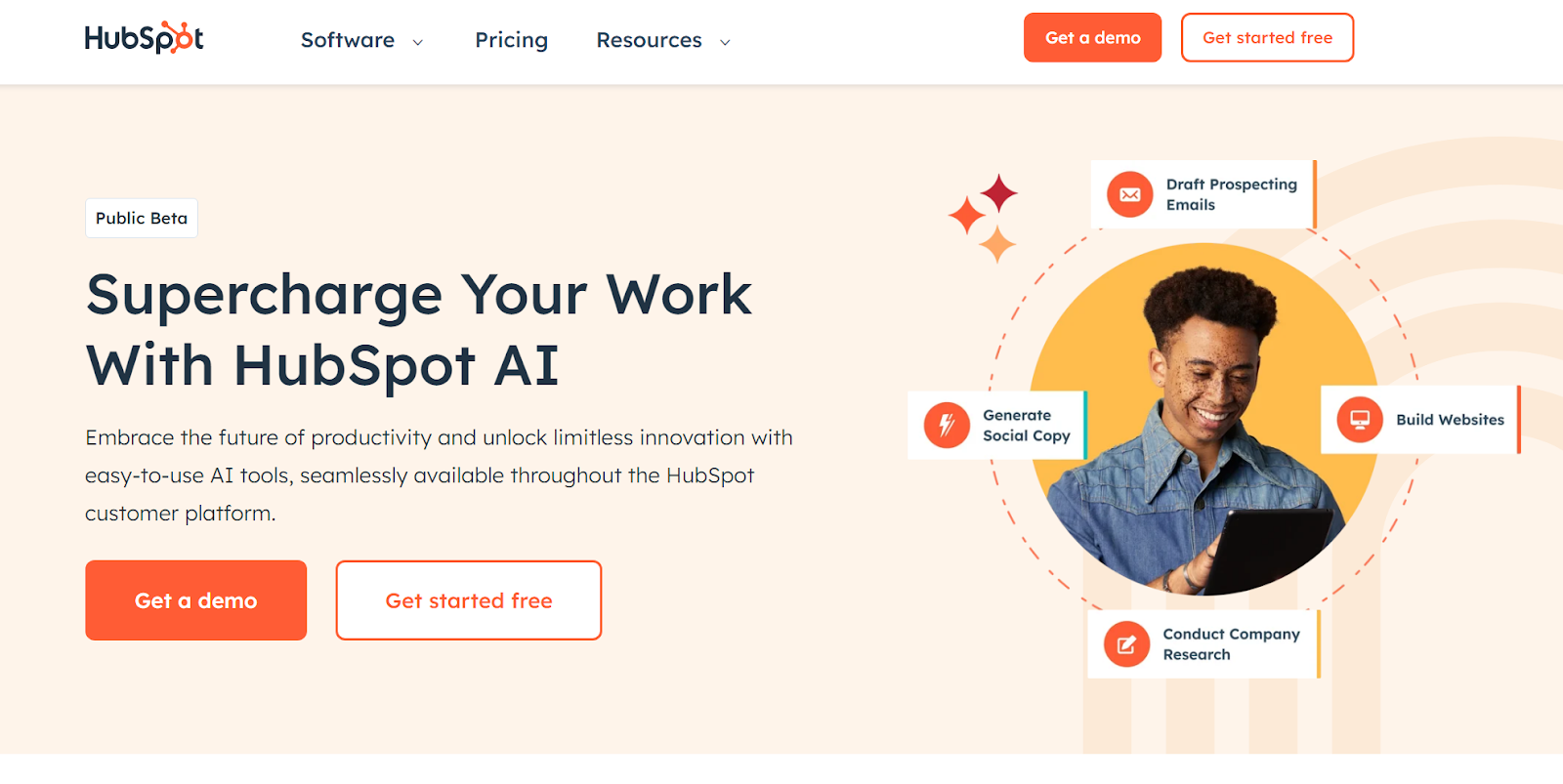
HubSpot’s AI tools can definitely help marketing, sales, and customer service departments work more efficiently, but they are still well behind the capabilities of Salesforce.
What they do have going for them is content marketing prowess.
HubSpot currently has 1,311 pages targeting AI keywords, which bring in over 91k in organic traffic every month — for context, that’s about six times as much traffic as Salesforce.
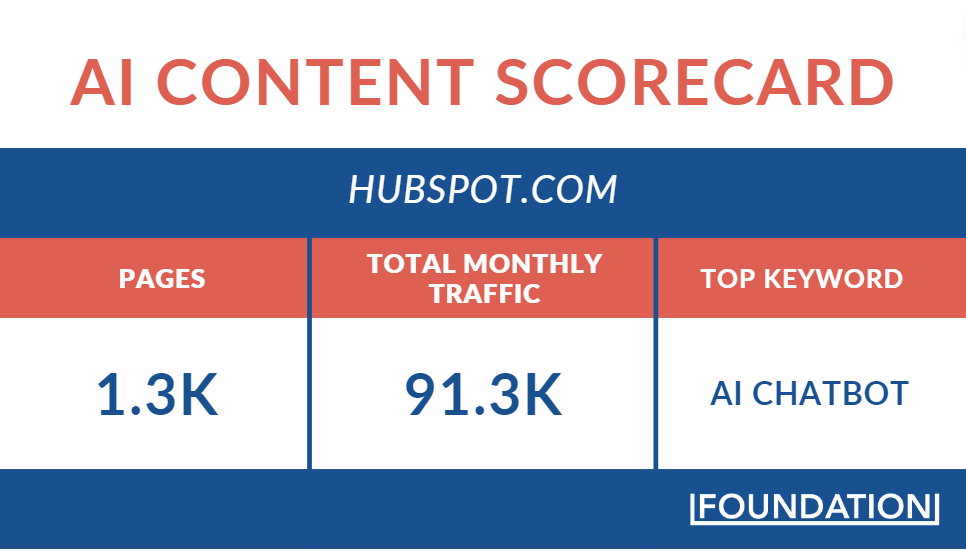
The HubSpot marketing team masterfully uses content to simultaneously build up their authority in the AI-CRM space and bring more potential users into their funnel.
HubSpot’s top-performing AI-related page is actually a mid-funnel listicle of the top 19 chatbot tools available in 2024. This piece currently brings in over 25% of all their AI-related traffic — 28,000 organic visits every month at a value of $17,000!
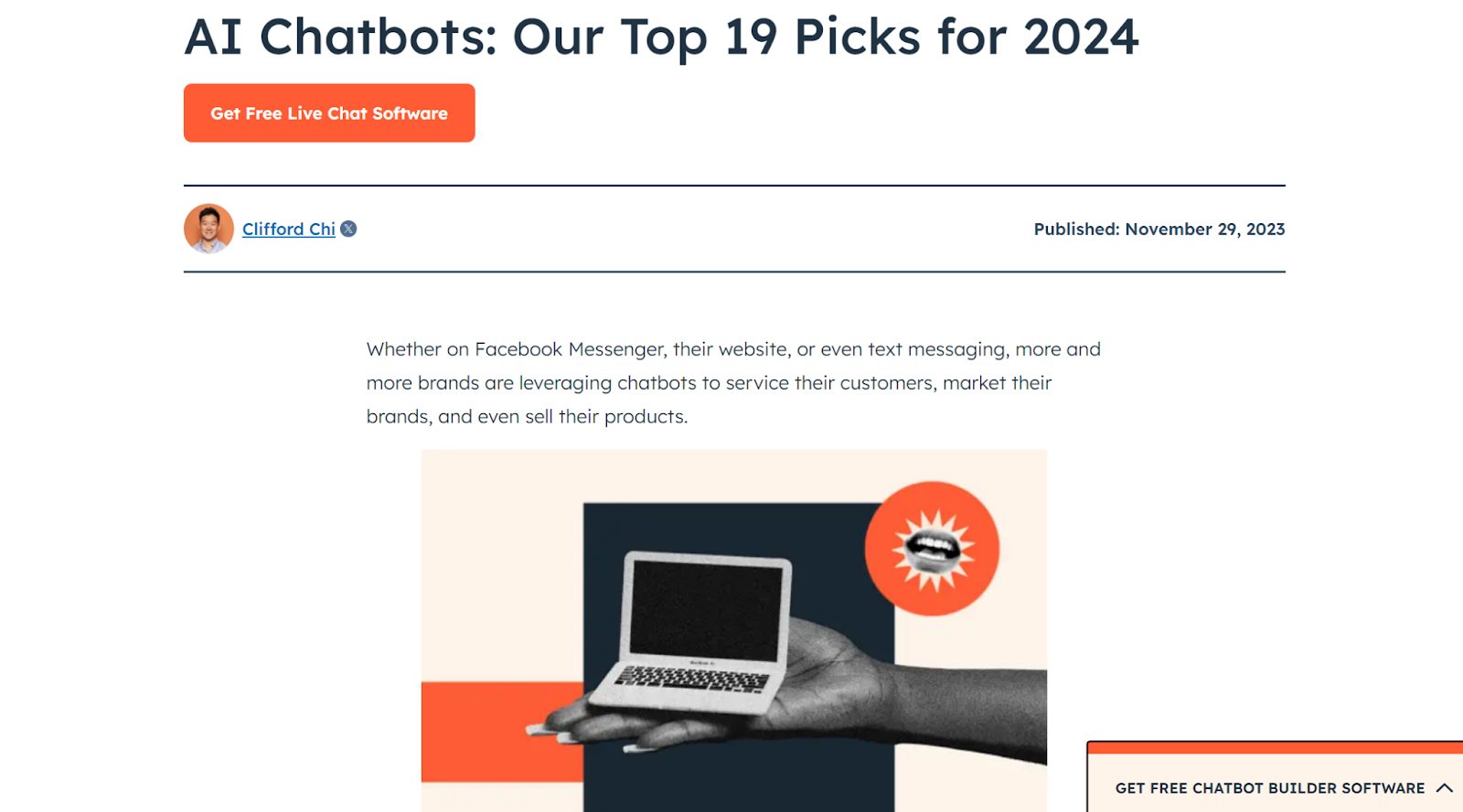
HubSpot uses the piece to position ChatSpot as a top freemium option for people interested in using GPT-style tools. Among the other tools like ChatGPT, Jasper, and Perplexity, the Hubspot team also includes a plug for their free Chatbot Builder tool on the list. (The tool is technically part of a different product strategy, the HubSpot Smart CRM, but, hey, it never hurts to plug two options.)
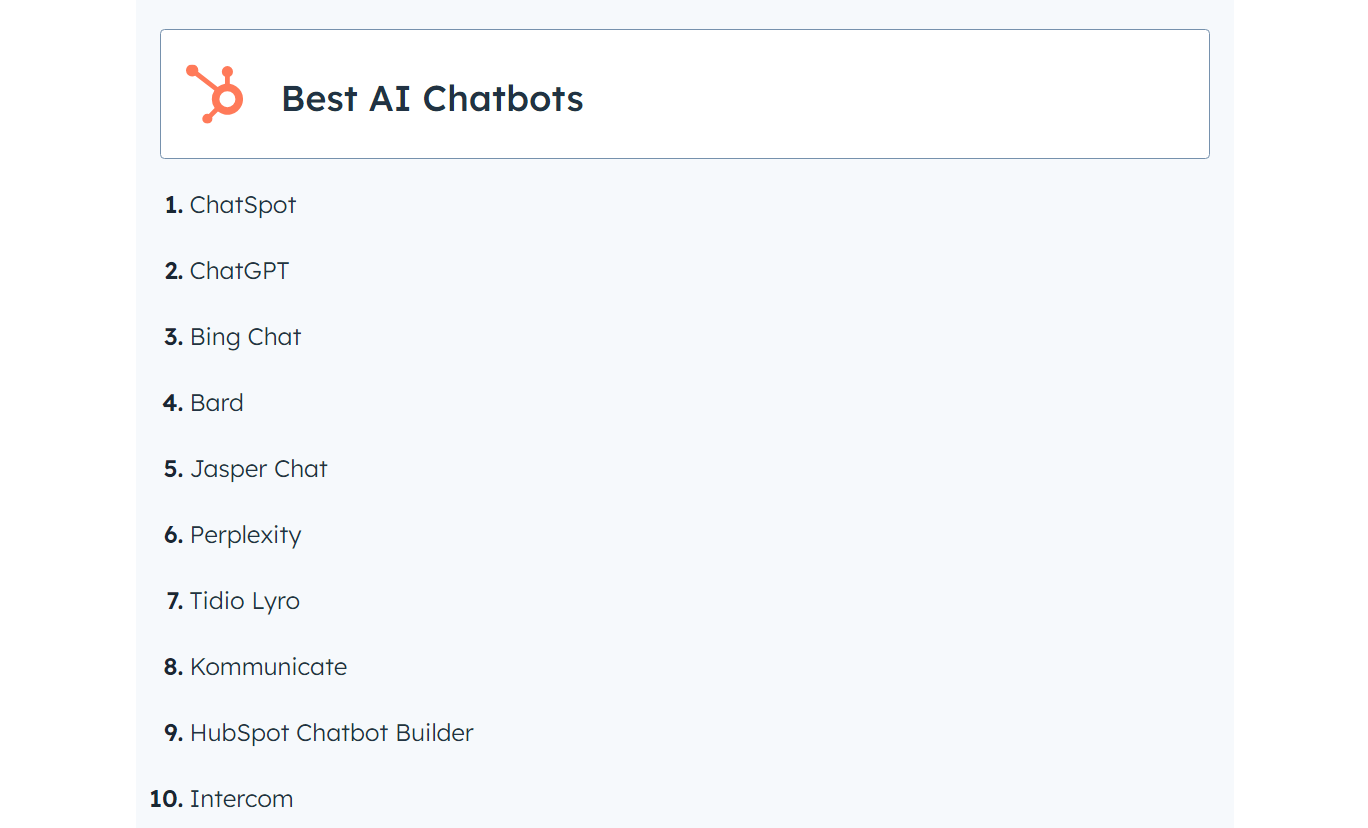
The ChatSpot section contains a number of links directing readers to this free tool that exists on a distinct website, which opens up some great options from a marketing perspective.
ChatSpot is essentially a microbrand released under the HubSpot umbrella, creating a lot of opportunities in terms of cross-branding and backlinking between the two distinct sites.
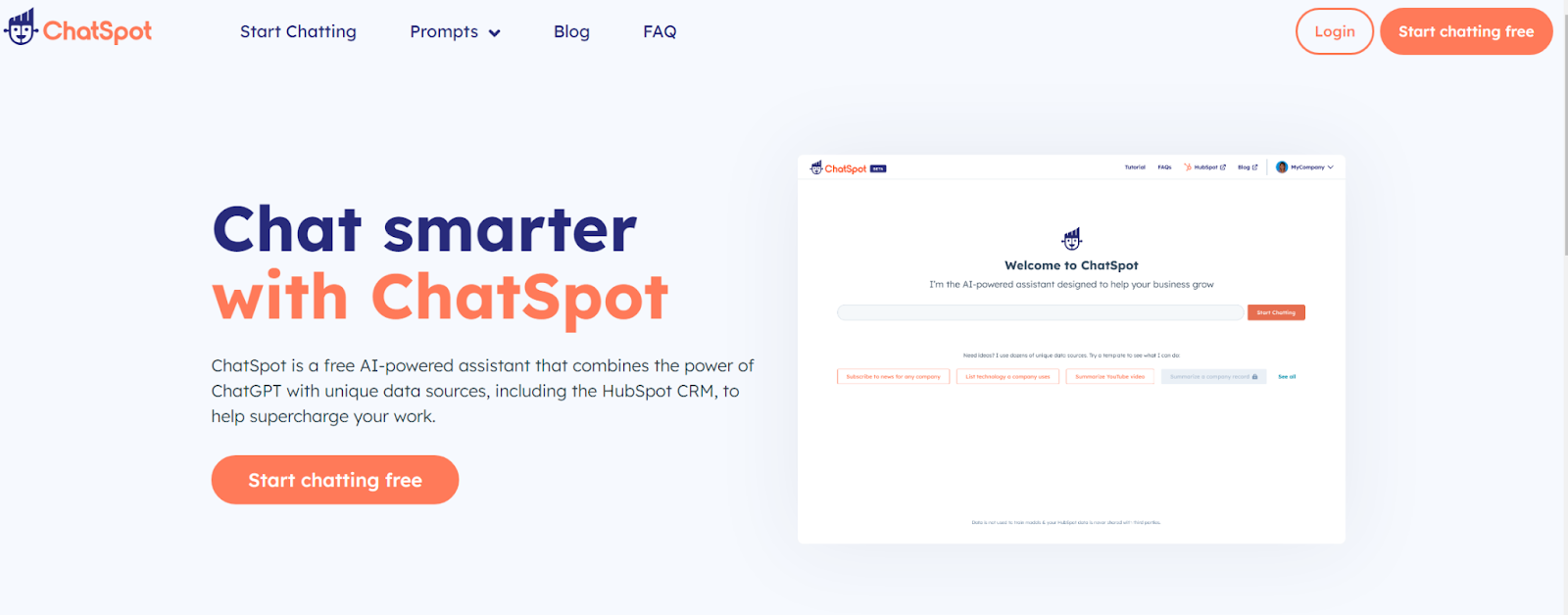
There are currently over 263 backlinks directing both traffic and valuable link equity from the HubSpot site over to ChatSpot. So, despite the fact that the ChatSpot website only has 29 pages, it currently brings in 1,000 organic visits per month and has already achieved a domain rating of 63 on Ahrefs.
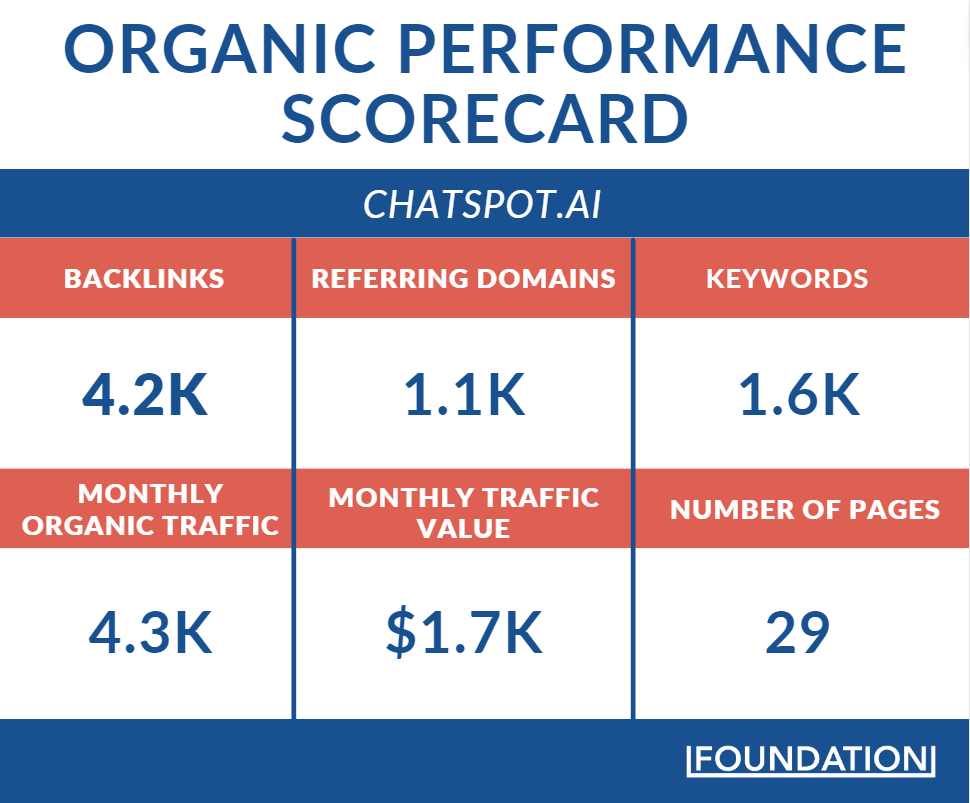
This backlinking hack is a great way to quickly boost the domain authority of an owned website and could give HubSpot the boost they need to expand their position.
If you want to see an example of this strategy in another CRM context, see how Zoho uses backlinks to flank the industry with their downmarket option called Bigin.
Unfortunately, there’s not enough time in the day to cover all the good things HubSpot is doing to promote their AI offerings with content. But there are a few more tactics worth highlighting, such as how they:
- Direct site visitors to the HubSpot AI landing page using over 98,000 internal links from other assets
- Invest in research-heavy reports on current trends like the HubSpot Blog’s State of AI Report
- Create a YouTube playlist full of videos that link to web pages for ChatSpot and other HubSpot AI tools

HubSpot has always been at the front of the pack in terms of B2B SaaS marketing, and we’d all be wise to keep an eye on them as AI continues to penetrate all niches.
How Can Smaller CRMs Catch Up?
With the immense size of the CRM niche, it’s impossible for every company to grab the market share of Salesforce or HubSpot. These two giants have the financial resources, partnerships, and customer base to successfully integrate AI into their product suite — not to mention the marketing engine to quickly build out an SEO moat on AI-CRM-related keywords.
Let’s take a look at how some smaller organizations are navigating the AI boom.
Pipedrive
It’s strange to call a company that’s raised $90 million in venture capital funding a mid-size business, but that’s what Pipedrive is relative to the SaaS giants we just covered.
Pipedrive has used AI internally to assist with business intelligence features and customer experience but announced in mid-2023 that they would roll AI into the CRM platform to “transform the user experience and business potential” for their over 100,000 SMB clients.
The press release accompanying this announcement provided a tantalizing glimpse into the future, outlining a series of AI-powered features slated for rollout in the last quarter of 2023 and beyond:
- AI-powered features for sourcing and qualifying leads with the most potential
- Natural language processing automations that let users create complex workflows through text input
- A Sales Assistant 2.0 to help with win rate forecasting and provide actionable recommendations
- An AI-translated knowledge base to provide sales teams around the world with access to info
In terms of content, though, Pipedrive only has 50 AI-related pages on their website, bringing in just over 1,000 organic visits per month.
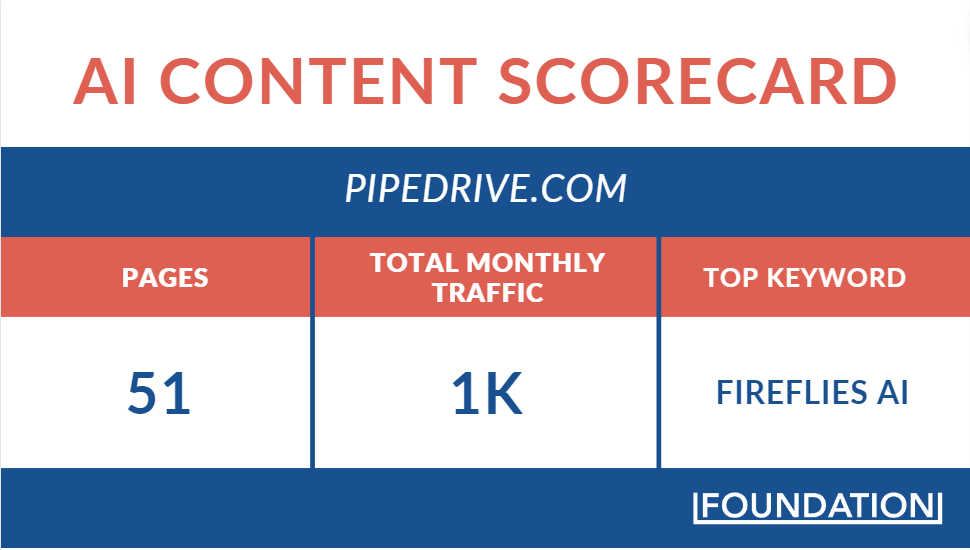
The best-performing page is actually under the company’s marketplace subfolder, where customers can integrate with or install other apps that increase the platform’s functionality.
This marketplace page covers how Pipedrive users can install Fireflies.ai — a call recording and transcription tool. It includes:
- A product description
- Instructions on how to set it up
- Reviews from current users
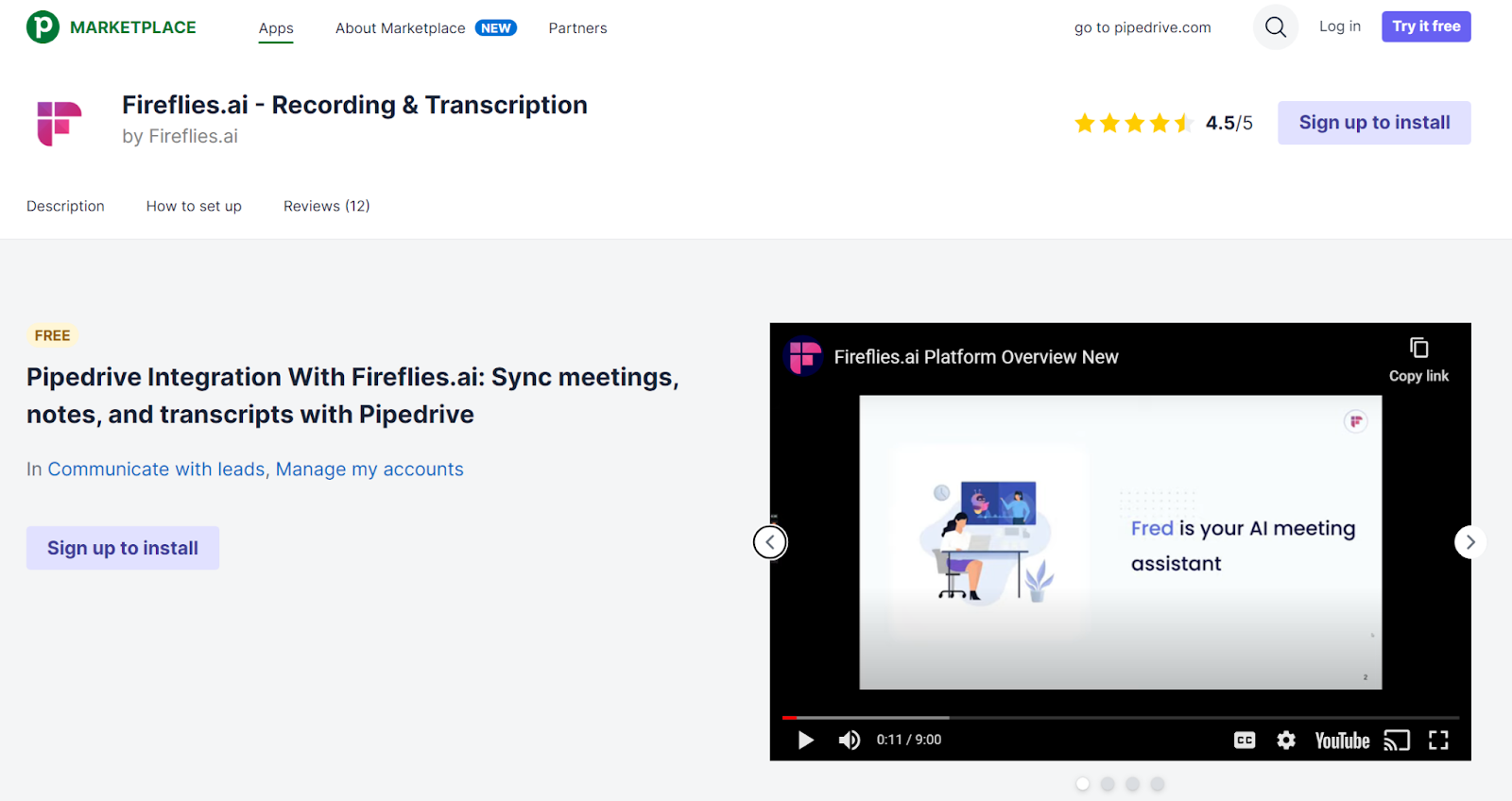
As far as promoting their own AI tools, Pipedrive still has a long way to go. The top product page on the site is for their AI Sales Assistant feature, which brings in over 100 visits each month.
The page walks through the different capabilities of this feature and provides an overview of its benefits. It also includes a few CTAs for readers interested in trying the feature for free.
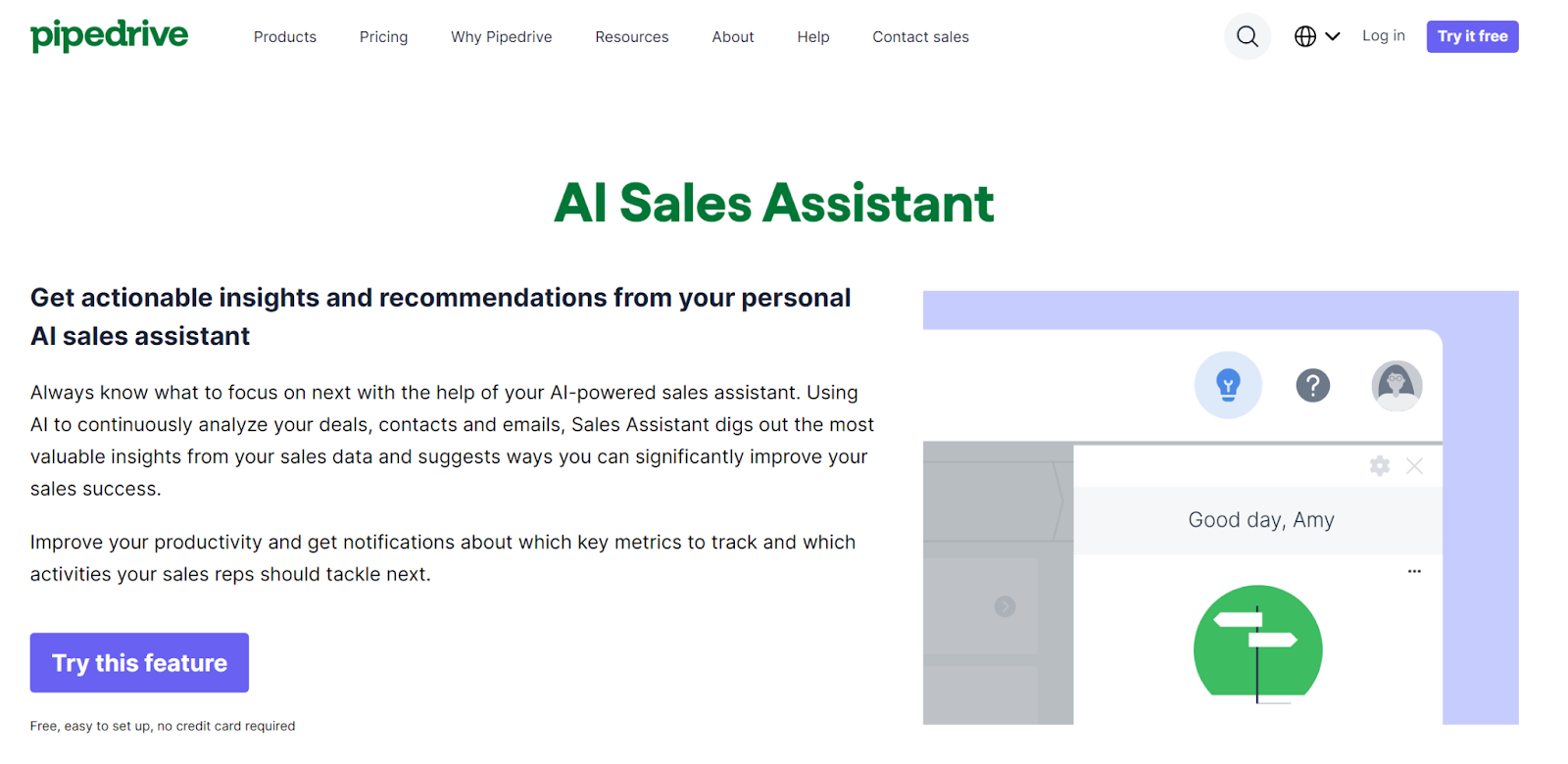
This AI Sales Assistant was released in October of 2023 as a beta to power up the existing Sales Assistant used by 60% of active Pipedrive customers. The company is taking a measured approach to AI integration, stating, “Our goal is not to integrate AI into our product just for the sake of it…”
While this type of measured approach makes sense on the product side, it would be wise for Pipedrive to invest in AI-related content sooner rather than later.
Building up an archive of user education and support content around key terms like “AI sales assistant” and “AI sales bot” will allow them to quickly funnel site visitors to product pages when they are ready for full release.
Close CRM
Close CRM, like Pipedrive, is a product for startups and SMBs. They also happen to be a relatively small business themselves.
Close doesn’t have all the bells and whistles of large SaaS vendors. Because they don’t have a massive amount of funding or revenue, they can’t build out a custom AI tool or create a white-label product using an API from OpenAI or one of its competitors.
But the strength of Close lies in their simplicity, affordability, and functionality. These attributes make it particularly appealing to their target audience of startups and SMBs, for whom cost efficiency and straightforward utility are often priority considerations.
For the users wanting some level of AI functionality, Close actually offers a few different tools, including:
- AI email writer
- Cold email generator
- Subject line generator
- Call assistant
By focusing on email-related tools, Close can start building out expertise in a specific CRM-related activity. It’s a smart play.
On the content front, Close only has 50 pages on their site targeting AI-related keywords, which bring in about 435 monthly visits. The top pages are mainly related to the free tools that Close offers, like their AI email writer, cold email generator, and sales forecasting. That said, they have also invested in blog content.
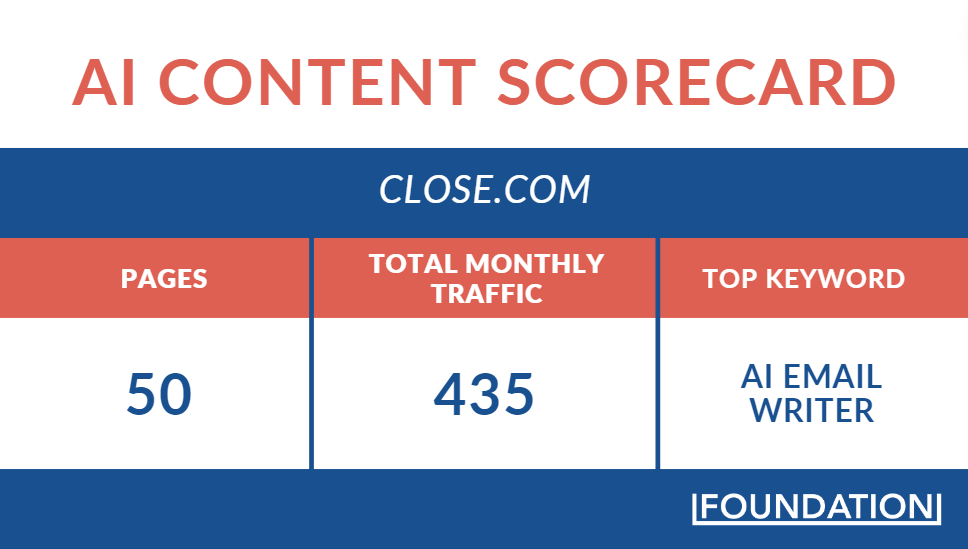
The email generator tool is Close’s most successful page at the moment — by a long shot. It brings in about 64% of their AI-related traffic, good for about 280 visits per month. The page also lets visitors test out the Close AI email generator for free.
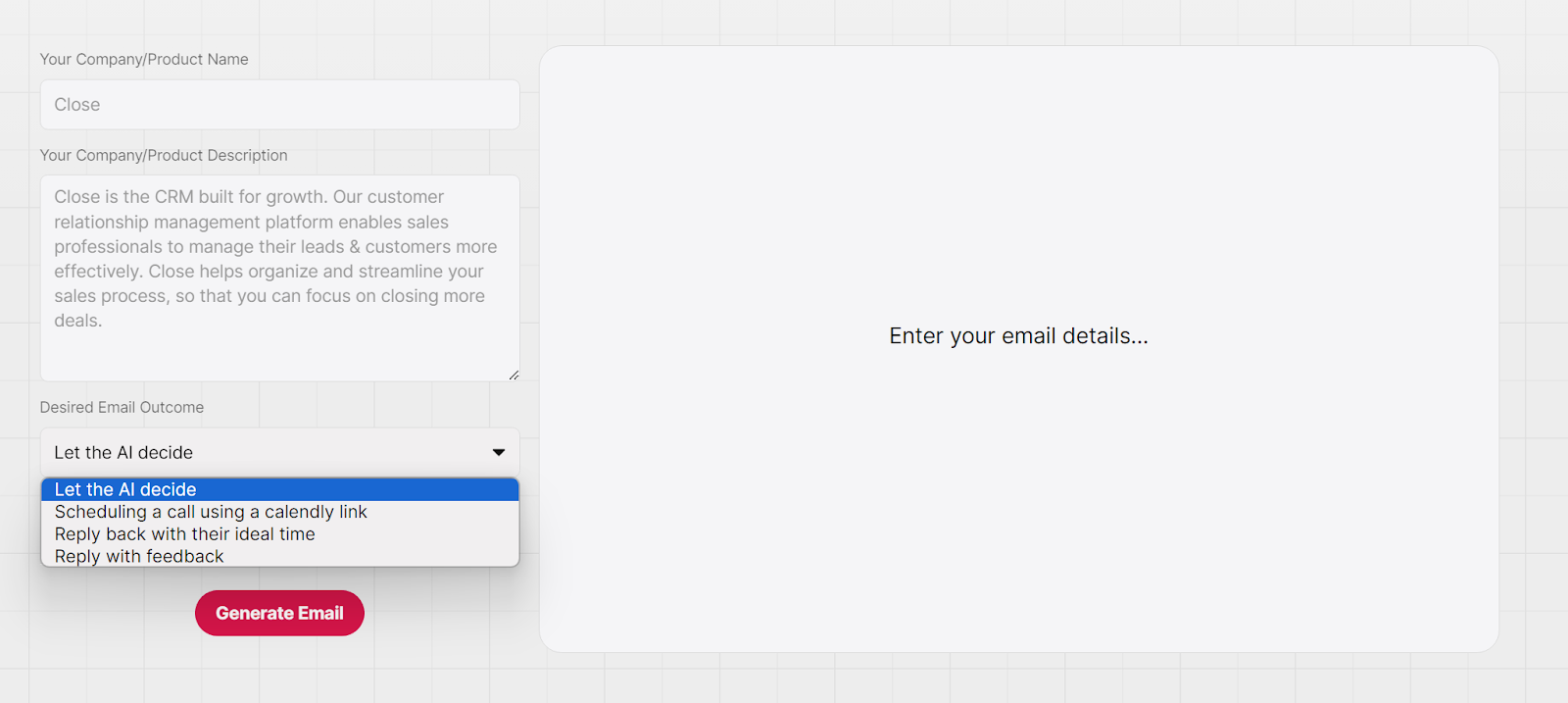
It’s nothing fancy in terms of UX, but this email generator is just the type of tool that a startup or SMB founder might get their team to use in order to keep costs low.
Close is also investing in blog content to support their journey into AI-powered CRM. They currently have 13 blog posts targeting terms related to AI in CRM, including topics like sales forecasting, sales enablement, and even content marketing.
The top blog post is a piece outlining 5 ways to Utilize AI for Sales Forecasting. It’s an empowering, educational piece of content that lists different ways SMB and startup owners can realistically use AI.
Teaching their audience the ins and outs of using AI for sales activities will be increasingly important as these tools continue to enter tech stacks — Close is making a wise investment.
Adopt the Investment Mindset and Build a Winning Content Strategy
As companies like Salesforce and HubSpot pioneer AI-driven strategies, the importance of content marketing in educating and engaging users becomes clear — particularly for the smaller CRMs like Pipedrive and Close.
Continued investment in content marketing is key for any company looking to build out AI tools, whether it’s in the near future or down the road. Creating content about AI informs potential and existing customers about its transformative power while also showcasing how to apply AI in their day-to-day.
Learn how adopting an investment mindset around content can help leaders in the CRM space position themselves for growth as AI continues to integrate with the modern tech stack.







